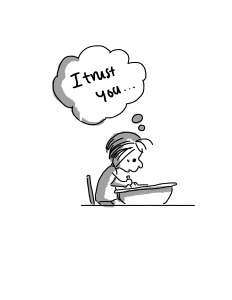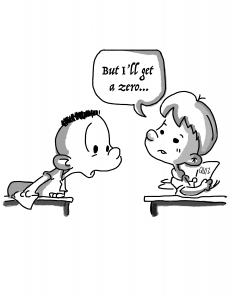
At my house, I am allowed to take my own allowance. My parents trust me to do my homework. Alcohol has been left unconcealed since I was a kid, but I have never drank any. Perhaps, because of the trust my parents put in me, I felt compelled to prove them right.
Similarly, I believe that creating a community of responsible students is a better way to uphold academic honesty than only enforcing a traditional punishment system.
I don’t think we should do away with the traditional system of basic rules against cheating altogether, but rather supplement it with community responsibility-focused methods of establishing more trust.
No one wants another advisory session about academic integrity, and it’s nearly impossible to force people to do things they don’t believe in. Moreover, it is not always possible to catch a cheating student. When punishment is designed to be the main disincentive, students may avoid cheating for fear of punishment rather than because they believe it is wrong. This leads students to cheat when they think they can get away with it.
It won’t be easy to create a community that upholds its own academic honesty. However, it is possible. At the rigorous California Institute of Technology, the responsibility each student feels toward the honor code means students can take tests outside the classroom and have 24-hour access to labs and other campus facilities. At Haverford College in Pennsylvania, students design and uphold their own honor code, creating a trusting campus where students can take tests without proctors and may safely leave their laptops open and bikes unlocked. Paly can strive toward the same goal. Therefore, students should similarly be encouraged to ask questions about why we have the rules we do and be able to vote on amending them.
When you cheat, you lose the opportunity to learn, to know how well you could have performed and to feel proud of your accomplishment. You receive guilt and a grade that does not represent your knowledge if you are lucky, and punishment and a zero if you are not. You also hurt other non-cheating students.
The solution to cheating is not fear of punishment but a community of students who value academic integrity. For students to uphold the rules we have at Paly, they must believe in them.

Honesty is the best policy — except at Palo Alto High School when it comes to test-taking. The competitive academic spirit that permeates Paly inherently breeds academic dishonesty, and as such, teachers should practice more stringent anti-cheating enforcement.
For most people, no matter how strong they claim their morals to be, the main incentive against cheating is a fear of being caught. In a 2012 study led by the University of Washington, researchers administered a math test and gave participants access to a button which allowed them to “check their answers” before inputting responses without any penalty. A large majority (68 percent) used the button — in other words, cheated.
As depressingly Machiavellian as this result is, it reflects a truth relevant to Paly: To promote a culture of fairness, we must uphold the anti-cheating punishments we have in place. Sure, a lot of the academic dishonesty at Paly is relatively benign. We help our friends in different periods by letting them know how the test went. We laugh at ludicrous stories of students typing formulas into water bottle stickers or taping cheat sheets to the inside of their shirts. There’s even a WikiHow page dedicated to teaching students clever step-by-step ways to cheat. (Please note that neither I nor Verde as a whole condone any of these methods.)
The idea of cheating seem to be rebellious and exhilarating. But if getting away with misdeeds becomes the norm, or is even deemed ingenious, the values we hold in our society — hard work, education, intelligence — fall to the wayside. Disingenuity pertains not only to supposedly harmless school assignments, but also to all other aspects of life, including relationships, sports and work. If cheating isn’t curbed now, then when will it be?
In our community, many deem college and stellar grades sacred, and ruining a student’s chance at those things sacrilege. Our ends are honorable; however, they don’t always justify our means. When a student is caught cheating, the teacher should adhere to Paly Handbook regulations and give the student a zero rather than a gentle warning. However rigorous our academic environment, it should never give us a voucher for cheating — even when we don’t get caught.



